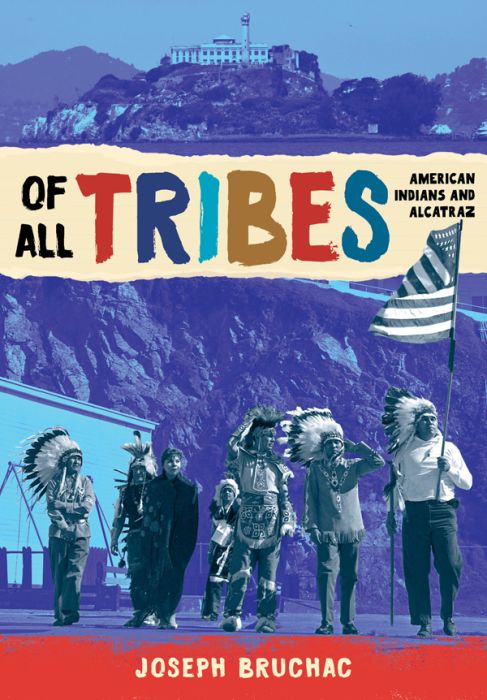School Library Journal

Of All Tribes: American Indians and Alcatraz
By Joseph Bruchac
Edition
By Joseph Bruchac
Hardcover edition
Publisher Abrams Imprint Abrams ISBN9781419757198
Of All Tribes: American Indians and Alcatraz
 26.02
26.02
Out of stock
SKU
9781419757198J
Abenaki children’s book icon Joseph Bruchac tells the stirring history of the 1969 Occupation of Alcatraz by Native Americans, which established a precedent for Indian activism
On November 20, 1969, a group of 89 Native Americans—most of them young activists in their twenties, led by Richard Oakes, LaNada Means, and others—crossed San Francisco Bay under the cover of darkness. They called themselves the “Indians of All Tribes.” Their objective was to occupy the abandoned prison on Alcatraz Island (“The Rock”), a mile and a half across the treacherous waters. Under the 1868 Treaty of Fort Laramie between the US and the Lakota tribe, all retired, abandoned, or out-of-use federal land was supposed to be returned to the Indigenous peoples who once occupied it. As Alcatraz penitentiary was closed by that point, activists sought to reclaim that land, and more broadly, bring greater attention to the lies and injustices of the federal government when it came to Indian policy.
Their initial success resulted in international attention to Native American rights and the continuing presence of present-day Indigenous peoples, who refused to accept being treated as a “vanishing race.” Over the protestors’ 19-month occupation, one key way of raising awareness to issues in Native life was through Radio Free Alcatraz, which touched on: the forced loss of ancestral lands, contaminated water supply on reservations, sharp disparities in infant mortality and life expectancy among Native Americans compared to statistics in white communities, and many other inequalities.
From acclaimed Abenaki children’s book legend Joseph Bruchac, this middle-grade nonfiction book tells the riveting story of that 1969 takeover, which inspired a whole generation of Native activists and ignited the modern American Indian Movement. The Occupation of Alcatraz had a direct effect on federal Indian policy and, with its visible results, established a precedent for Indian activism.
On November 20, 1969, a group of 89 Native Americans—most of them young activists in their twenties, led by Richard Oakes, LaNada Means, and others—crossed San Francisco Bay under the cover of darkness. They called themselves the “Indians of All Tribes.” Their objective was to occupy the abandoned prison on Alcatraz Island (“The Rock”), a mile and a half across the treacherous waters. Under the 1868 Treaty of Fort Laramie between the US and the Lakota tribe, all retired, abandoned, or out-of-use federal land was supposed to be returned to the Indigenous peoples who once occupied it. As Alcatraz penitentiary was closed by that point, activists sought to reclaim that land, and more broadly, bring greater attention to the lies and injustices of the federal government when it came to Indian policy.
Their initial success resulted in international attention to Native American rights and the continuing presence of present-day Indigenous peoples, who refused to accept being treated as a “vanishing race.” Over the protestors’ 19-month occupation, one key way of raising awareness to issues in Native life was through Radio Free Alcatraz, which touched on: the forced loss of ancestral lands, contaminated water supply on reservations, sharp disparities in infant mortality and life expectancy among Native Americans compared to statistics in white communities, and many other inequalities.
From acclaimed Abenaki children’s book legend Joseph Bruchac, this middle-grade nonfiction book tells the riveting story of that 1969 takeover, which inspired a whole generation of Native activists and ignited the modern American Indian Movement. The Occupation of Alcatraz had a direct effect on federal Indian policy and, with its visible results, established a precedent for Indian activism.
|
Standard MARC Records Cover Art |
Praise & Reviews
Instructional Nonfiction History Grades 6-8
Instructional Nonfiction History Grades 6-8
Instructional Nonfiction History Grades 6-8
For Grades 6-8
This collection provides 12 nonfiction books per year, offering a mix of series and standalone titles that encourage critical thinking and historical analysis. With sensitive treatments of complex topics and vibrant imagery, these books make history accessible and engaging.
12 books per Year
$312.24 per Year
Interests
Biographies, History, Nonfiction




